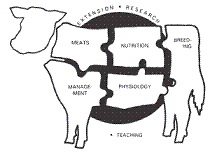Animal Science, Department of

Nebraska Beef Cattle Reports
Date of this Version
January 2000
Abstract
Two hundred forty-five crossbred yearling steers were used in a randomized complete block design to determine effects of including a programmed gain phase in the feeding period on performance and carcass characteristics. Including a programmed gain phase in the finishing period resulted in similar cumulative daily gains and feed conversions when compared with steers allowed to consume feed ad libitum. Programming gain reduced the total amount of feed consumed per animal; however, the lack of an improvement in feed conversion coupled with slight numerical differences in hot carcass weights resulted in net profits favoring ad libitum feeding.


Comments
Published in Nebraska Beef Cattle Report 2000, published by Agricultural Research Division, University of Nebraska Cooperative Extension, and Institute of Agriculture and Natural Resources, University of Nebraska–Lincoln.